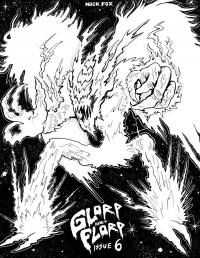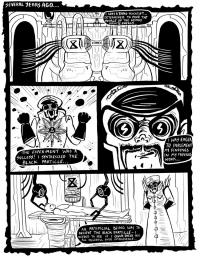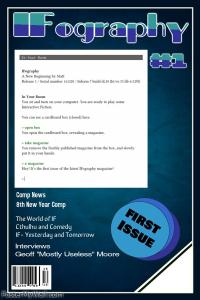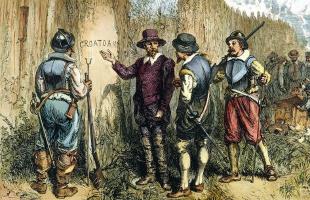Copy Link
Add to Bookmark
Report
Forever Alive Issue 06

F O R E V E R A L I V E L i t e
-------------------------------------------------------------
Issue Number 6 June 1996
-------------------------------------------------------------
Forever Alive is the world's premier magazine on the subject
of physical immortality. We offer a new vision of humanity, as
completely whole, beyond the polarities of life and death,
spirit and body, mind and heart, male and female. This
pioneering magazine explores the transformative powers of
embracing a life without limits.
This file is best viewed in a monospaced font, such as
Courier.
-------------------------------------------------------------
FOREVER ALIVE IS NOW ON THE WEB!
Visit our Web Site at http://www.people-forever.org
-------------------------------------------------------------
C O N T E N T S
* TURNING POINTS
by Herb Bowie
* THE UNCOOL
A Poem by Injy Tawa
* GET SO FAR AWAY FROM DEATH THAT IT CAN'T FIND YOU ANYMORE!
by James Russell Strole
-------------------------------------------------------------
TURNING POINTS
by Herb Bowie
For the last ten years, I have been closely associated with an
organization now called People Forever International. I will
grant you that we are an unusual group, in several ways. We
believe that people can, and should, live forever. We also
believe that one of the keys to achieving this state of
physical immortality is a new quality of human togetherness.
Some of the forms this togetherness has taken include regular
weekly meetings, monthly weekend events, and an annual
"Convergence" that lasts one to two weeks.
Many of my family members, friends and associates have a hard
time understanding what has gotten into me. For most people,
this idea of physical immortality and these forms of
togetherness are difficult to relate to. These new beliefs and
behaviors appear to have come out of the blue. One day, they
seem to think, Herb was walking around like any other person,
normal to all outward appearances. Then--Bam!--suddenly he
thinks he is immortal, and is consorting with this odd group
of people. What happened?
For me, though, this is not at all how it looks. I was not
subject to a sudden and unexpected conversion. Instead, I see
my involvement with People Forever as the natural culmination
of a long series of turning points, each one taking me a step
closer to these people, to this life. Others have come by
different routes, so there is no magic to these particular
events. Yet all of my experiences have been shared by many
others, so perhaps by describing them, and what they have
meant to me, it will be easier for others to come along, or at
least to understand how I got here.
Religion
My parents tried. They really did. They raised me as a good
Methodist. My faith in an omnipotent deity expired, though,
one fateful year after I discovered the box my chocolate egg
had come in, and the awful truth dawned on me that the Easter
bunny was a hoax.
By comparison, it was relatively easy to give up God. The
story of the Easter bunny was at least a simple tale, even if
untrue. The vast maze of Christian religious beliefs, in
contrast, always held a note of artifice for me. I have
generally found the truth to be relatively simple--unexpected,
perhaps, but still convincingly simple. Religion, though,
always sounded to me like a lie that had gone on for too long.
You know the kind. When you try to cover up the truth, you
start by telling a simple lie. But then, if someone begins
questioning you, trying to reconcile your lie with what they
know to be true, you end up weaving an increasingly complex
tapestry of falsehood, piling one fabrication on top of
another. These types of stories, even when they successfully
avoid any obvious contradictions, never quite seem convincing.
Like bad scientific theories, they seem to introduce more
questionable suppositions then they purport to explain. Even
though they cannot be proven wrong, they lack the ring of
truth.
Religion raised many important questions for me. Why are we
here? How were we created? Why do people die? Yet the answers
always struck me as too complicated to be true. None of the
answers ever seemed to satisfy.
The Beatles
The music of The Beatles only partially explained their appeal
to me. There was something else about them that seemed
revolutionary, some trait always implied but never openly
stated.
The Beatles had a togetherness that I longed for. Not the
homogenized, uniform sameness that I saw around me, but
something new, something that celebrated diversity and unity
at the same time.
In the early years of their success, they all dressed alike,
all sported the same haircuts, all made the same music
together. Yet they were not faceless band members. They all
had distinct and obviously different personalities. And there
was not a single front man, as in so many other groups. No one
was in the foreground or background. Unlike any musical group
before or since, they were often introduced on the radio
simply by their first names: John, Paul, George and Ringo.
Four distinct individuals who at the same time formed a
cohesive whole. People who came together for a common purpose
without sacrificing their individuality. Four human beings who
changed the world by forming a bond that went beyond
conventional relationships of family, friends and work. People
who transformed those around them, not through the words they
spoke, but through the music they made, the jokes they made,
their appearance, their very presence.
"Catch-22"
Joseph Heller's darkly comic novel had the ring of truth about
it. It poked fun at the absurdity of religious beliefs, yet
betrayed a deeply felt respect for the human ideals and
longings embodied in these beliefs.
At the most literal level, "Catch-22" was about World War II.
At a deeper level, it was about the absurdity of all war. At
many points, though, Heller uses WWII as a metaphor for
modern society in general, extending the reach of the book
beyond the trenches of combat.
At its most basic level, though, this book speaks to a
universal human condition. There are many "catches" in the
book, many ways in which the characters are caught between
hope and reality, between desire and possibility. Many of
these catches seem pointless, the arbitrary decisions of a
mindless bureaucracy. As the book progresses, though, and its
central mystery is revealed, the ultimate "catch" becomes
clear: we want to live, but we have to die. As Yossarian feels
by the end of the book, there has to be a better way.
College
In 1969 I left my family home in Annapolis, Maryland and began
four years of college at the University of Michigan, in Ann
Arbor.
College was a magical place for me. It was like a storybook
land. Sandwiched between the stark constraints of growing up
with my family (as wonderful as they were), and the routine
and responsibility of the working world, were four years of
magnificent freedom.
I lived in a dormitory, and then apartment buildings, with
other roommates. The confining expectations of families and
bosses were nowhere to be found. I lived in a society whose
purpose was learning and discovery of new truths: both in and
out of the classroom, on and off campus. The traditional
relationships of family members and coworkers were missing. I
had friends, but beyond friendship there was this tremendous
sense of shared experience, with the hundred or so students I
met in classrooms each semester, the thousands I shared a
campus with, and the millions in other colleges across the US,
and around the world. We were being birthed by, and at the
same time giving birth to, a new culture. I started in the
school of Engineering, switched to Physics for a semester,
then surrendered a scholarship from Lockheed so that I could
major in English literature--for no better reason than that I
felt drawn to it.
I have never lost this desire to be a co-creator of an
emerging culture, to live in a society dedicated to learning
and the discovery of new truths, new thoughts, and new
realities.
The Films of Frank Capra
One of the great benefits of the U. of M. was that various
student film societies screened recent and classic movies on a
regular basis. If you wanted to, you could see a different
film practically every night of the week. European films were
all the rage on college campuses at this point, and many were
darkly lit and full of despair.
One weeknight, in the middle of winter, I can remember going
to a small auditorium with one of my best friends to see an
old black-and-white American comedy. The director had been one
of the most commercially successful of his generation, but his
films were currently out of style with academia, considered
too sentimental and naively optimistic.
We sat in the dark for an hour and a half, surrounded by no
more than a handful of fellow students. When the movie was
over, we discovered it was snowing outside. We lived in
different directions, and it was too late to go anywhere else,
so we stood there in the cold and falling snow and talked
about the film we had just seen. We were so excited that we
stayed there, talking in the dark, for what seems like at
least an hour, before we could bear to go our separate ways.
The film was "You Can't Take It With You". It was directed by
Frank Capra, one of the acknowledged masters of the American
cinema (his work has since come back into popularity). Other
Capra films are "It Happened One Night", "Meet John Doe", "Mr.
Smith Goes to Washington" and the holiday classic "It's A
Wonderful Life".
Viewed today, generally on television, squeezed between reruns
of old sitcoms, it is easy to mistake Capra's films for trite
Americana. Watch closely, though, and you will find deeply
felt beliefs in the redemptive power of community and in the
ultimate sanity of quirky individuality, and an abiding
mistrust of politics, big business and the media.
Capra's faith in the ultimate goodness of humanity was rocked
by the same World War that gave birth to "Catch-22". His films
stirred in me a renewed hunger for this strange mix of
togetherness and diversity.
Group Therapy
After college I moved to Los Angeles. Despite the handicap of
having a degree in English, I stumbled across a job in
computers, and found a career that was both interesting and
financially rewarding.
I was not happy, though. My life felt empty. I had a few close
friends, but nothing that really stirred me, really motivated
me. A friend referred me to a therapist she had been seeing, a
wonderful woman named Jennifer Reese. Jenny practiced Gestalt
therapy, and after a few individual sessions she asked me to
join one of her ongoing groups.
In society's eyes, the goal of therapy was to restore me to
normality. In reality, though, group therapy opened up a whole
new world for me. I found a level of emotional honesty that I
had never before experienced. I found a setting in which
people shared what was really going on within them, beneath
the normal facades that got them through the day. I
experienced a new sense of community, among the six to eight
people in my group, and others I met at encounter weekends.
People in Jenny's practice came from all walks of life, and
all sorts of backgrounds, and I felt nourished by this close
communion with a group of people I never would have chosen,
had I been left to choose on my own. I flourished in an
atmosphere that encouraged personal growth and transformation,
and not just dependable reliability.
In society's eyes, therapy was supposed to fix me and send my
on my way. In reality, though, these few hours a week
rekindled a hunger in me for a different way of life. I found
what I had been missing, but it was only partially something
that had been missing in me--it was also something missing
from my daily life, and from the lives of those around me.
Marriage
In 1978 I met a wonderful woman with whom I seemed to have
nothing in common. On our first date we attended a movie that
I loved and that she hated. There was something that drew us
together, though, despite our differences. Two years later we
were married (with Jenny, my therapist, performing the
ceremony). Nothing was said about "until death do us part."
And inside the wedding band that Pauline gave me was a simple
inscription: "Forever".
The Rebirthing Community
Through a friend, Pauline discovered a weekend seminar called
the LRT--the Loving Relationships Training. The event included
a group rebirth on Saturday evening. Rebirthing is a breathing
technique that releases deep emotional memories, even allowing
the breather to re-experience, and then release, the pain of
their birth.
Much of what was taught on these weekends would now loosely be
called part of "New Age" thinking. The LRT weekend encouraged
people to take 100% responsibility for what happens to them.
It included a section on physical immortality. The trainers
encouraged people to see everything that happens as a choice,
up to and even including death. And so, if we can choose
death, then why not choose life instead?
Pauline and I attended many of these weekends, eventually
becoming assistants ourselves. These were wonderful
experiences, but we were finally left hungry for more. We
enjoyed the community, but were eventually frustrated by the
fact that community was not viewed as a primary goal, but as
an accidental byproduct of another process that was supposed
to transform people and then send them on their way.
People Forever
In 1986 we moved to Arizona, and stumbled across People
Forever. Here, finally, we found what we had been looking for.
Instead of the confusion of religion, we found a simple truth:
people deserve to live. We found people who celebrated
diversity and the uniqueness of each individual, yet who also
wanted to build a togetherness strong enough to keep us
together forever. We found an ongoing community of people who
encouraged unending growth, change and transformation for
everyone they met. We found people who could say anything and
everything to each other, without fear of reprisal or
abandonment. And we found people actively co-creating a new
culture that started and ended with the infinite value of each
human being.
Despite outward appearances, it was no accident that I found
these people, that I chose this life, and that I choose to
live it forever. The hungers and ideals that led me here have
been present all along. Even when lost in the middle of a
wilderness, a compass still turns true. Looking back now, it
is easy to see the bends in the road that brought me here,
each one taking me a step closer to my heart's desire. It may
not be the life for everyone, but it is my life, and it is
whole.
- - -
Copyright (c) 1996 by Herb Bowie.
-------------------------------------------------------------
The Uncool
by Injy Tawa
I'm the fire:
the fire that burns.
Without you,
the cobwebs and the ice collect
in the joints.
In the mornings
I creak to work,
to a world of wonder:
nice and cool people,
headed for marked graves
in desolate fields somewhere--
to rest.
But I'm headed to you:
my once buried treasure,
my endless delight,
whose physical presence ignites
immortal DNA,
humiliating ancestral genetics
of death
with your penetration.
I walk city streets.
I watch the cool saunter.
They tell me:
Cool down.
Cool it.
Keep your cool.
Cool off.
I tell them:
You, with the bulletproof vest
for a soul--
beware the flames
and scorching heat of me,
for I come with hundreds
of the uncool.
We spread
fingers of forever
across your faces,
where the vest has no effect.
We seep
through the harsh lead
you parade as a heart
and quick--
like a bullet--
shatter,
penetrate,
Then stand back to observe,
with infinite delight,
the melting abandonment
that,
despite yourself,
you become.
- - -
Originally published in Forever Alive magazine, Issue no. 26.
Copyright (c) 1995 by Injy Tawa.
-------------------------------------------------------------
GET SO FAR AWAY FROM DEATH THAT IT CAN'T FIND YOU ANYMORE!
by James Russell Strole
The Top Dog
People have created death to be so powerful. We've given it so
much praise and acknowledgment. When I was in high school it
always seemed that the most intimidating guy would be the most
popular. The top dog wasn't picked for being the most
sensitive person, but for being the coolest. He was picked
because he seemed so tough that nothing scared him. He was
chosen because he could look death in the eye and not blink.
He could seemingly live with death. He was death's right-hand
man.
I didn't like what I saw in high school. I saw people spit on
people--just because they dressed differently. I saw people
beat people up--just because they didn't fit into the
so-called norm. I hated that chemistry. And I thought, when I
get out of high school, the world will be different.
I found that nothing changed. I found that our whole society
was built the same way. The bullies still run the streets. The
gentle people are still attacked by the wolves. War is
constantly breaking out all over. The cool guys are still
running the show. The tough guys are still in charge. Death is
still the top dog.
A Hunger For Change
In the past few months, I've experienced some intense
tribulations. Things seemed awfully dark at times. But I made
a decision that--no matter what was going on--I was to open
myself up to a sound of my life. I opened myself up to the
sound of my flesh, and decided that this was my way through
the darkness.
Real living, when you let yourself feel it fully, is not all
joy. Sometimes there's pain involved, especially around
change. Human beings have a tendency to so fossilize
themselves, to get so stuck in ruts, that change becomes
painful. When a person whose arm has been broken and in a cast
for some time tries to move that arm, it's painful. In fact it
might even feel as if it can't move. It can be the same way
with any change.
Someone came to me recently about a problem she was having
with a change going on in her life. She was feeling some
resistance to the change. But she wasn't defending her
position. She wasn't defending her rigidity. This person said,
"These are the things I feel, and I want to change them in my
body." She hungered for a change.
It's a wonderful thing when we don't defend our resistance or
our depression, when we don't blame it on somebody else. It's
wonderful when we can feel our rigidity, and still hunger for
the change in our own bodies.
Getting Away From Death
This is something I've experienced deeply in the last few
months. It's one thing to say you don't want to be depressed.
It's not hard to say you don't want to be down. It's easy to
say you don't want to be sick. But how much do you not want to
be sick? How much do you not want to be depressed? How much
are you willing to change in order to stop feeling depressed?
In my case, I so hungered for a shift that I went deeper. And
I found that I had to open up in my guts in a way I've never
opened before.
As I was going through this, I realized I don't just want a
reprieve from death. I don't just want to avoid it for a
while. I don't just want a break from it. I want to be out of
it once and for all. I want to be done with it for good.
That's my hunger. They say life is filled with bad and good,
so if you get a certain amount of what they call a good life,
you're supposed to be satisfied. You're supposed to settle for
a week here and there, or a month, or a few years of respite.
That doesn't satisfy me anymore. It's not enough. I'm not
willing to settle for a little bit. I don't just want a
respite from sorrow and depression--I want out of it totally.
I've tasted death. I've tasted depression. I've tasted sorrow.
I don't like the taste--it's bitter. I don't want anything to
do with it anymore. I want totally out of the pit.
You know, sometimes when people feel depressed, they watch a
bunch of happy movies, or do something else to feel uplifted
for a while. They give themselves a break from depression.
They put a bandage on it, to cover it up.
It's not enough for me. I want all the way out. I want all the
way out from death. I want to get so far away from death that
it can't find me anymore. I want to be so far removed from it
that I can't see it, no matter where I look. I don't want to
just pacify myself for a week or two. I want to be so far away
from any capacity to have depression, so far away from feeling
anything ugly or unclean about my own body, that depression
can't even find me.
End the Polarities
The law of gravity says that what goes up must come down. The
law of death has said the same thing about people. Oh, let's
remove each other from the gravity of death. Let's end the
polarity of coming down because we've been up for too long.
Living in the polarity of life and death will wear you out.
You'll live a joyous life one week, only to be visited by
death again the next. Hot and cold, cold and hot, hot and
cold. How many of those can you take until you crack? That's
what cracks the earth--the constant going back and forth
between the hot and the cold. How much can human flesh take
before it cracks?
I don't want that world. It does not make sense to me. I want
out of it completely. I'm moving myself beyond what seemed to
be the logical: the logic of pain, the logic of release, the
logic of relief. I don't want an antacid just to relieve me
for a while from the burning in my gut. I want a fire in my
belly that is ongoing, that consumes the pain and the sorrow.
Don't give yourself time for depression. The fastest way out
of your pain, your depression, is for you to give your
aliveness to another. It's so powerful to give what you want.
The fastest way out of depression is for you to embrace
someone else's life, for you to get so caught up in what you
can give to your life, rather than what you can get out of it.
It puts you on a whole new track.
Let's leave the land of death behind. I'm not talking about
being on a high. I'm not talking about being abnormal. I'm
talking about being totally alive. I'm talking about an
aliveness so total that we can't be stalled out anymore, we
can't be stopped in our tracks, we can't be dragged back. I'm
talking about being so completely alive that nothing can ever
stop us from going for what we want. I'm talking about a
continuous movement of our flesh that carries us beyond the
reaches of death--forever.
Let's go there together.
- - -
Originally published in Forever Alive magazine, Issue no. 27.
Copyright (c) 1996 by People Forever International.
-------------------------------------------------------------
M A S T H E A D
Editor: Herb Bowie
Forever Alive Lite is published more or less monthly, by
People Forever International.
E-MAIL ADDRESS
herbbowie@aol.com
MAILING ADDRESS
PO Box 12305, Scottsdale, AZ 85267-2305
TELEPHONES
1 (602) 922-0300 Voice
1 (602) 922-0800 FAX
1 (800) 2B4-EVER Toll-Free
Copyright (c) 1996 by People Forever International. You may
freely distribute this file electronically on a
non-commercial, nonprofit basis to anyone, and print one copy
for your personal use, but you may not alter or excerpt this
file in any way without direct permission from People Forever
International.
-------------------------------------------------------------



















